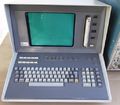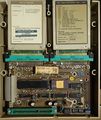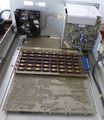4051: Difference between revisions
No edit summary |
No edit summary |
||
| (36 intermediate revisions by 4 users not shown) | |||
| Line 1: | Line 1: | ||
{{Instrument Sidebar | |||
|manufacturer=Tektronix | |||
|model=4051 | |||
|class=Computer | |||
|series=4050-series computers | |||
|summary=Graphics-capable desktop microcomputer | |||
|image=Tek_4051.jpg | |||
|caption=Tektronix 4051 | |||
|introduced=1975 | |||
|discontinued=(?) | |||
|designers=Hiro Moriyasu; | |||
|manuals= | |||
* [[Media:070-1940-01.pdf|4050 Series Operator's Manual]] | |||
* [[Media:070-2056-01.pdf|4050 Series Reference Manual]] | |||
* [[Media:070-2065-00.pdf|4051 Graphic System Service Manual Vol.1]] | |||
* [[Media:070-2286-00.pdf|4051 Graphic System Service Manual Vol.2]] | |||
* [[Media:070-2270-00.pdf|4051 GPIB Hardware Support]] | |||
* [[Media:070-3985-00.pdf|Tektronix GPIB Programming Guide]] (4050 series, [[TM5000]] series) | |||
The 4051 was released in 1975 for the base price of $5,995 ( | * [http://bitsavers.trailing-edge.com/pdf/tektronix/405x/ 4050 series manuals] @ bitsavers | ||
* [[Media:Tek_4051_basicref.pdf|Tektronix 4051 BASIC Reference Guide]] (OCR) | |||
}} | |||
The '''Tektronix 4051''' is a graphics-capable desktop microcomputer produced by Tektronix in the late 1970s through the early 1980s. The display is similar to the Tektronix [[4010]] terminal, using a [[direct-view storage CRT]] display (like an analog storage scope) to avoid the need for video RAM. | |||
An all-in-one design, the 4051 includes display, keyboard, CPU and a 300 kByte [https://en.wikipedia.org/wiki/Quarter-inch_cartridge DC300 quarter-inch cartridge tape drive] in a single desktop case, and includes a [[GPIB]] interface. A simple operating system and BASIC interpreter are stored in ROM. | |||
The storage tube display allows the screen to retain images drawn to it, eliminating the need for frame-buffer memory, and allowing the resolution to be as high as the display hardware can handle - logical coordinates are 1024 by 1024 of which the physical screen displays 1024 by 780. This type of display does not require a raster buffer memory, so all memory can be dedicated to programs and data. | |||
The 4051 is based on an 8-bit [[Motorola 6800]] CPU running at 1 MHz, and normally shipped with 8 kB of RAM expandable to 32 kB using 8 kB modules. | |||
The remaining 32 kB of address space is reserved for ROM, which can be expanded using one or two external ROM cartridges of 8 kB each. The ROM includes six character sets and an extended dialect of BASIC including various vector drawing commands. | |||
'''Option 1''' adds a Data Communication Interface [[021-0188-00]] that attaches to the rear of the 4051 via a card-edge connector and provides an RS 232 port and two slots to accept expansion ROM cartridges/packs. | |||
The 4051 was released in 1975 for the base price of $5,995 (2020 value $28,960). Adding the optional RS-232 interface allowed it to emulate a Tektronix [[4012]] terminal. | |||
Key designer of the 4051 was [[Hiro Moriyasu]]. | Key designer of the 4051 was [[Hiro Moriyasu]]. | ||
==See Also== | |||
* [[Patent US D244614S]] | |||
* [[021-0188-00]] '''Option 1''' Data Communication Interface | |||
* [[4051F10|4051F10 - RS-232 Printer Interface]] | |||
* [[4050E01|4050E01 - ROM Expander]] | |||
* [[4051R07|4051R07 - Signal Processing Cartridge Number 1]] | |||
* [[4051R08|4051R08 - Signal Processing Cartridge Number 2]] | |||
* [[4907|4907 "File Manager" floppy disk drive (GPIB)]] | |||
* [[4924|4924 cartridge tape drive (GPIB)]] | |||
* [[Media:Hp 9830 to tek 4051 prog conversion.pdf |HP 9830 to Tektronix 4051 Program Conversion Guide]] | |||
* [https://archive.org/download/tek_4051_applications_library_master_tape_num_19/tek_4051_applications_library_master_tape_num_19.pdf Tektronix 4051 Applications Library Master Tape Number 19 Documentation] | |||
* [[:Category:4050-series_computers#Links]] | |||
==Links== | ==Links== | ||
===General Information=== | |||
* [[Media:4051_Brochure.pdf|Tektronix 4051 Brochure (PDF)]] | * [[Media:4051_Brochure.pdf|Tektronix 4051 Brochure (PDF)]] | ||
* [https://en.wikipedia.org/wiki/Tektronix_4050 Tektronix 4050 series at Wikipedia] | * [https://en.wikipedia.org/wiki/Tektronix_4050 Tektronix 4050 series at Wikipedia] | ||
* [[Media:Tekscope_1975_V7_N5.pdf | Tekscope 1975 Vol.7 No.5: ''A desk-top graphic computing system'']] | * [[Media:Tekscope_1975_V7_N5.pdf | Tekscope 1975 Vol.7 No.5: ''A desk-top graphic computing system'']] | ||
* [http://bitsavers.informatik.uni-stuttgart.de/pdf/tektronix/405x/Tektronix-4051-1976.pdf 4051 leaflet from 1976] | * [http://bitsavers.informatik.uni-stuttgart.de/pdf/tektronix/405x/Tektronix-4051-1976.pdf 4051 leaflet from 1976] | ||
===Museums=== | |||
* [http://www.tekmuseum.com/tek-museum_009.htm 4051 @ tekmuseum.com] | * [http://www.tekmuseum.com/tek-museum_009.htm 4051 @ tekmuseum.com] | ||
* [http://www.datormuseum.se/computers/others/tektronix-4051 4051 @ Dalby Datormuseum] | * [http://www.datormuseum.se/computers/others/tektronix-4051 4051 @ Dalby Datormuseum] | ||
===Videos=== | |||
* [https://www.youtube.com/watch?v=9yCHW0tQrAA Tek 4051 at work] @ YouTube | * [https://www.youtube.com/watch?v=9yCHW0tQrAA Tek 4051 at work] @ YouTube | ||
* [[ | * 4051 introduction @ YouTube - [https://youtu.be/xWrIS_l5HWk part 1] / [https://youtu.be/wZKfOTkEZKU part 2] / [https://youtu.be/DvcFw9jPLEs part 3] / [https://youtu.be/-lUSDb-1NDg part 4] / [https://youtu.be/V3ET9xRb82c part 5] / [https://youtu.be/tXeQoHw950E part 6] / [https://youtu.be/a94uJjTOjTY Emulator] | ||
===Software=== | |||
* [https://github.com/mmcgraw74/Tektronix-4051-4052-4054-Program-Files Tektronix 4051/4052/4054 Program Files] (GitHub repository) | |||
* [http://www.bitsavers.org/pdf/tektronix/405x/fiche/4051_Firmware/ 4051 firmware listings (microfiche scans)] @ bitsavers | |||
{{Documents|Link=4051}} | |||
==Pictures== | |||
<gallery> | |||
Tek_4051_front_01.jpg|Front view | |||
Tek_4051_keyboard_01.jpg|Keyboard | |||
Tek 4051 with 4924 tape drive.jpg | 4051 with [[4924|4924 GPIB cartridge tape drive]] | |||
Tek_WP1110_01.jpg|4051 with connected [[P7001|DPO]] - [[SPS|WP1110]] | |||
Tek_WP1110_front.jpg|4051 with connected [[P7001|DPO]] - [[SPS|WP1110]] | |||
Tek_4051_back_01.jpg|[[021-0188-00]] Option 1 Data Communication Interface | |||
Tek_4051_back_02.jpg|Back side detailed view | |||
Tek_4051_back_03.jpg|Back side detailed view | |||
Tek_4051_comint01.jpg|[[021-0188-00]] Option 1 Data Communication Interface | |||
Tek_4051_comint02.jpg|[[021-0188-00]] Option 1 Data Communication Interface | |||
Tek_4051_comint03.jpg|[[021-0188-00]] Option 1 Data Communication Interface | |||
Tek_4051_inside01.jpg|Inside view | |||
Tek_4051_ram.jpg|RAM board | |||
Tek_4051_mb01.jpg|main board | |||
Tek_4051_monitor.jpg|Screen without frame | |||
Tek_4051_pwr01.jpg|Power supply | |||
Tek_4051_pwr02.jpg|Power supply | |||
Tek_4051_roms.jpg|ROMs closeup | |||
4051ad.png | 4051 ad | |||
</gallery> | |||
==Advertising== | |||
<gallery> | |||
Tek_4051_electronics_1976_05_13.jpg|4051 advertising in Electronics magazine 1976 | |||
</gallery> | |||
==Components== | |||
{{Parts|4051}} | |||
[[Category: | [[Category:4050-series computers]] | ||
[[Category:GPIB interface]] | [[Category:GPIB interface]] | ||
[[Category:RS-232 interface]] | [[Category:RS-232 interface]] | ||
Latest revision as of 08:48, 9 October 2023
The Tektronix 4051 is a graphics-capable desktop microcomputer produced by Tektronix in the late 1970s through the early 1980s. The display is similar to the Tektronix 4010 terminal, using a direct-view storage CRT display (like an analog storage scope) to avoid the need for video RAM.
An all-in-one design, the 4051 includes display, keyboard, CPU and a 300 kByte DC300 quarter-inch cartridge tape drive in a single desktop case, and includes a GPIB interface. A simple operating system and BASIC interpreter are stored in ROM.
The storage tube display allows the screen to retain images drawn to it, eliminating the need for frame-buffer memory, and allowing the resolution to be as high as the display hardware can handle - logical coordinates are 1024 by 1024 of which the physical screen displays 1024 by 780. This type of display does not require a raster buffer memory, so all memory can be dedicated to programs and data.
The 4051 is based on an 8-bit Motorola 6800 CPU running at 1 MHz, and normally shipped with 8 kB of RAM expandable to 32 kB using 8 kB modules.
The remaining 32 kB of address space is reserved for ROM, which can be expanded using one or two external ROM cartridges of 8 kB each. The ROM includes six character sets and an extended dialect of BASIC including various vector drawing commands.
Option 1 adds a Data Communication Interface 021-0188-00 that attaches to the rear of the 4051 via a card-edge connector and provides an RS 232 port and two slots to accept expansion ROM cartridges/packs.
The 4051 was released in 1975 for the base price of $5,995 (2020 value $28,960). Adding the optional RS-232 interface allowed it to emulate a Tektronix 4012 terminal.
Key designer of the 4051 was Hiro Moriyasu.
See Also
- Patent US D244614S
- 021-0188-00 Option 1 Data Communication Interface
- 4051F10 - RS-232 Printer Interface
- 4050E01 - ROM Expander
- 4051R07 - Signal Processing Cartridge Number 1
- 4051R08 - Signal Processing Cartridge Number 2
- 4907 "File Manager" floppy disk drive (GPIB)
- 4924 cartridge tape drive (GPIB)
- HP 9830 to Tektronix 4051 Program Conversion Guide
- Tektronix 4051 Applications Library Master Tape Number 19 Documentation
- Category:4050-series_computers#Links
Links
General Information
- Tektronix 4051 Brochure (PDF)
- Tektronix 4050 series at Wikipedia
- Tekscope 1975 Vol.7 No.5: A desk-top graphic computing system
- 4051 leaflet from 1976
Museums
Videos
- Tek 4051 at work @ YouTube
- 4051 introduction @ YouTube - part 1 / part 2 / part 3 / part 4 / part 5 / part 6 / Emulator
Software
- Tektronix 4051/4052/4054 Program Files (GitHub repository)
- 4051 firmware listings (microfiche scans) @ bitsavers
Documents Referencing 4051
| Document | Class | Title | Authors | Year | Links |
|---|---|---|---|---|---|
| Tekscope 1975 V7 N5.pdf | Article | A Desk-top Graphic Computing System | Colin Barton | 1975 | 4051 |
| Tekscope 1975 V7 N5.pdf | Article | Graphing With the 4051 Graphic Computing System | Tom Needham | 1975 | 4051 |
| Tekscope 1977 V9 N2.pdf | Article | The Fundamental Beauty of Computer Graphics | Bruce Rodgers | 1977 | 4012 • 4014 • 4051 |
| Tekscope 1981 V13 N2.pdf | Article | Software Innovations Increase Productivity of Desktop Computer Users | Bruce Rodgers | 1981 | 4051 • 4052 • 4054 • PLOT50 |
| Tekniques vol.6 no.1.pdf | Article | A Fast Unidirectional TTY Interface for a Minicomputer | R. Christie Harper • Ben M. Williams • James E. Gaiser | 1982 | 4051 |
| Tekniques vol.6 no.1.pdf | Article | 4050 Controls New Generation of Programmable Instruments for Measurement Automation | 1982 | 4051 • 4052 • TM5000 system • TM5003 • TM5006 • DM5010 • DC5009 • DC5010 • FG5010 • PS5010 • SI5010 • MI5010 • MX5010 |
Pictures
-
Front view
-
Keyboard
-
4051 with 4924 GPIB cartridge tape drive
-
021-0188-00 Option 1 Data Communication Interface
-
Back side detailed view
-
Back side detailed view
-
021-0188-00 Option 1 Data Communication Interface
-
021-0188-00 Option 1 Data Communication Interface
-
021-0188-00 Option 1 Data Communication Interface
-
Inside view
-
RAM board
-
main board
-
Screen without frame
-
Power supply
-
Power supply
-
ROMs closeup
-
4051 ad
Advertising
-
4051 advertising in Electronics magazine 1976
Components
Some Parts Used in the 4051
| Part | Part Number(s) | Class | Description | Used in |
|---|---|---|---|---|
| Motorola 6800 | 156-0426-00 | Monolithic integrated circuit | 8-bit microprocessor | 021-0206-00 • 021-0374-00 • 067-0902-00 • 067-1137-99 • 222 • 222A • 222PS • 2424L • 2445 • 2465 • 4051 • 7912 • 7912AD • 7A16P • 7A29P • 7B81P • 7B90P • 833 • 834 • CG5001 • CG551AP • CG5010 • CG5011 • DF1 • DF2 • DM5010 • MI5010 • SI5010 • PS5004 • PS5010 • SG5010 |




















